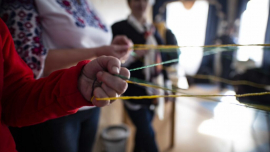Iryna Dovhan, Head of SEMA Ukraine, took part in the International Congress "Rethinking Ukraine and Europe: New Challenges for Historians".
On September 15-17, 2023, Vilnius University hosted the International Congress
"Rethinking Ukraine and Europe: New Challenges for Historians", organized by a number of
international academic institutions, which was attended by more than 150 scholars
from different countries, including a large number of Ukrainian historians.

The participants of the congress had the opportunity to learn about grant programs and meet representatives of foundations that fund international projects in the field of historical research, join thematic panel discussions, and find partners for possible new joint research.
The main goal of the congress is to discuss the creation of a new narrative of the history of Ukraine and the entire region of Central and Eastern Europe. The following questions were put on the agenda and discussed:
- How should we rethink the history of Ukraine and interpret it from a more transnational perspective in the broader context of European and global history?
- To what extent should we rethink the established themes and issues of our research in Ukrainian studies that have been established for at least 30 years?
- How can we rethink and revise national memory policies and cultures in the Ukraine-Lithuania-Belarus-Poland region to make them more transnational?
The crimes against civilians in 2014-2023 were discussed by
Petro Vyhivskyi (Association of Relatives of Political Prisoners of the Kremlin),
Isabella Pech (All-Ukrainian movement of hostage families "Come Back Alive"),
Kateryna Ohievska (Chernihiv, civilian organization "Civilians in captivity"),
Tetiana Katrychenko (Kyiv, Media Initiative for Human Rights).
The situation with Ukrainian prisoners and hostages - victims of war crimes in Russian captivity, including those who were imprisoned until February 24, 2022, in Crimea and Donbas - was discussed by family members of prisoners and hostages.
In the discussion of the topic "Civilians as Russian Hostages. Collecting testimonies and documenting crimes: difficulties in the work" was attended by the following speakers:
Monika Andruszewska (Warsaw, Lemkin Center),
Tetiana Katrychenko (Kyiv, Media Initiative for Human Rights)
Iryna Dovhan (Global Network of Survivors of Sexual Violence during the War, Head of NGO SEMA Ukraine)
Kateryna Leontieva (Kharkiv/Warsaw, Lemkin Center)
Roman Ofitsynskyi (Uzhhorod) Peculiarities of Russia's war crimes against Ukraine
from February 24, 2022, to the present day.

джерело: https://vilniuscongress.com/ua/home
The International Congress "Rethinking Ukraine and Europe: New Challenges for Historians" is primarily related to the military and political challenges in Europe and the world, which contribute to strengthening the role of nation-states in the international arena and the rise of autocratic political regimes seeking hegemony. In addition, Russia's war against Ukraine has prompted historians to return to the scientific discourse on the role and ways of forming nation-states, from the perspective of both internal and external factors.
Therefore, it is not surprising that the central theme of the Congress was a lecture by Robert Frost, Professor of History at the University of Aberdeen (UK), entitled "The Past in the Present: Rethinking Ukraine, Europe, and the Role of the Nation-State in the Global Age." In his report, the scholar actualized the problem of the existence of nation-states in the modern globalized world, and also drew attention to the role of objectivity in covering the historical past, especially such aspects as the state-forming nations, linking this to the fact that at one time discussions around the glorification of some nations became the basis for denying the idea of the existence of other nations. At the same time, the historian focused on the fact that despite the complexity of the geopolitical situation in Europe and Ukraine, historians of modern countries must be objective when covering national issues to avoid making the mistakes of the late nineteenth and early twentieth centuries and not to form new totalitarian monsters like Nazism and fascism.




